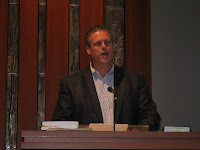On Sunday, June 13, Ohr Kodesh celebrated the conclusion of the Pledge 25 in Honor of Rabbi Lyle Fishman program year. Following the morning minyan where Rosh Chodesh Tammuz was observed, Pledge 25 Program Co-Chair Gary Simms welcomed attendees to the "siyyum." Citing Pirke Avot, Gary noted that the world stands on three things: on Torah, on Prayer, and on acts of loving-kindness. He suggested that these reflect both the Pledge 25 program and the attributes of Rabbi Fishman's leadership of the congregation.
Pledge 25
 Committee member Erica Raphael offered thanks and acknowledgment to the facilitators and Pledge 25 participants. More than 30 individuals served as speakers, teachers, and presenters during the course of the year's events.
Committee member Erica Raphael offered thanks and acknowledgment to the facilitators and Pledge 25 participants. More than 30 individuals served as speakers, teachers, and presenters during the course of the year's events. Two representatives spoke on behalf of the facilitators: Phil Schulman, who offered some of his signature humor, and Mickey Feinberg, who spoke of the importance of learning at each and every stage of life.
The Ohr Kodesh singers offered a delightful musical interlude.
Representing the younger generation, Jonathan Israel explained how he fulfilled his Pledge 25 responsibilities by raising more than $200 for Haiti Relief from fellow elementary school students. Gary Simms then read portions of a letter from NIH congratulating OKC member Gerry Feldman, who donated blood platelets sufficient to help 33 individuals, all in honor of Rabbi Fishman and Pledge 25.
Gary Simms then read portions of a letter from NIH congratulating OKC member Gerry Feldman, who donated blood platelets sufficient to help 33 individuals, all in honor of Rabbi Fishman and Pledge 25.
 Gary Simms then read portions of a letter from NIH congratulating OKC member Gerry Feldman, who donated blood platelets sufficient to help 33 individuals, all in honor of Rabbi Fishman and Pledge 25.
Gary Simms then read portions of a letter from NIH congratulating OKC member Gerry Feldman, who donated blood platelets sufficient to help 33 individuals, all in honor of Rabbi Fishman and Pledge 25.
Rabbi David Kalender of Congregation Olam Tikvah (Fairfax, VA), a chevrutah study partner with Rabbi Fishman, was the surprise guest at the morning's session, leading the congregation in a text study which demonstrated the importance of encouraging everyone to take active roles in the community.
 OKC member Barbara Garlock, who also serves as the Interim Executive Director of Interfaith Works, described the support received by her organization from Pledge 25 participants. She announced a Pledge 25-sponsored school supplies drive that will be continuing for the rest of June, and asked people to drop off donations in the lobby of Ohr Kodesh and to publicize this opportunity to their friends and neighbors.
OKC member Barbara Garlock, who also serves as the Interim Executive Director of Interfaith Works, described the support received by her organization from Pledge 25 participants. She announced a Pledge 25-sponsored school supplies drive that will be continuing for the rest of June, and asked people to drop off donations in the lobby of Ohr Kodesh and to publicize this opportunity to their friends and neighbors.Julie Herschthal, co-chair of the morning festivities, offered a commemorative presentation to Rabbi Fishman. In his own remarks, Rabbi Fishman responded with warm thanks to the committee, the participants, and to the congregation. He noted that his colleagues across the country have congratulated him for the concept. He stated that while the concept of Study, Prayer and Chesed is from the Mishna, the idea for the Pledge 25 program came from OKC President Brian Israel, who offered his own thanks to the Rabbi and to the organizing committee.
At the festive brunch which followed the presentation, members and guests enjoyed a delicious spread
Rabbi Fishman, Debra Rosenman, and Rabbi Kalender enjoy the brunch as well.



















